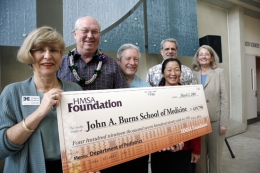(Honolulu, Hawaiʻi) — The Hawaiʻi Medical Service Association (HMSA) Foundation has announced it will provide $419,790 over three years to support the establishment of the Hawaiʻi Initiative for Childhood Obesity Research and Education (HICORE) within the Department of Pediatrics at the University of Hawaiʻi John A. Burns School of Medicine. In early 2008, representatives from different sectors of the community, who are involved in obesity and treatment programs, participated in a two-day retreat. Their goal was to examine the need for a coordinating, comprehensive program to facilitate and guide research and education in childhood and adolescent obesity. The HICORE initiative is the result of that retreat.
The mission of HICORE is to provide leadership in education and research to better understand and combat the obesity epidemic and to treat and improve the life of children and adolescents with complications of obesity. By bringing together individuals and organizations in Hawaiʻi, HICORE will be better able to understand and address the childhood obesity epidemic, especially among the most vulnerable of Hawaiʻi's children and families.
"The prevalence of obesity in Hawaiʻi's young people continues to grow with potentially devastating consequences for our families, our communities, our healthcare system and our patients," said Dr. Raul Rudoy. "Childhood obesity can cause serious physical and mental problems. As an example, it is estimated that two thirds of obese 5-10 year old children demonstrate at least one important cardiovascular risk factor, and that one third of all U.S. children will develop diabetes." Dr Rudoy continued, "Another important aspect of obesity is the social stigma and discrimination associated with obesity and the resulting low self-esteem." Raul Rudoy, MD, MPH, Chairman, Department of Pediatrics, John A. Burns School of Medicine.
Recent findings:
- The latest National Health and Nutrition Examination Surveys analysis, combining data from 2003 and 2006, estimated 16.3% of children and adolescents ages 2-19 years were obese and 31.9% were overweight. (Ogden 2008)
- A study of 10,199 children entering kindergarten from 2002-2003 in Hawaiʻi public schools found that 28.5% of the children were overweight or obese. (Pobutsky et al., 2006)
"With the increasing reports of high blood pressure and type 2 diabetes in children — diseases once thought to be prevalent only among adults — the need for a comprehensive and collaborative effort to better understand obesity in our young people is critical," said Dean Jerris Hedges. "We are grateful to the HMSA Foundation for their willingness to partner with us in this important endeavor." Jerris R. Hedges, MD, MS, MMM Dean and Professor of Medicine, Barry and Virginia Weinman Endowed Chair.
In order to meet their goals, HICORE will:
- Serve as a repository of child/adolescent obesity projects in Hawaiʻi.
- Provide guidance to local granting agencies and foundations regarding research in the area of childhood and adolescent obesity for the State of Hawaiʻi.
- Serve as a center for the education of community members, medical students, residents, physicians and others in the area of childhood and adolescent obesity in Hawaiʻi.
Conduct research on childhood and adolescent obesity relevant to people of Hawaiʻi.
"We're very pleased to support HICORE in its efforts to combat childhood and adolescent obesity in our community," said HMSA Senior Vice President and VP HMSA Foundation Cliff K. Cisco. "Obesity poses a serious health concern for our children and Hawaiʻi's health care system. The work of HICORE will go a long way to address this concern, and the HMSA Foundation is proud to support this important work."
The funds from the HMSA Foundation will be key in establishing HICORE and can be used for personnel, office supplies and equipment, communications, travel, meeting and conference expenses, website development and IT services, and other expenses related to fulfilling the purpose of the HICORE project.

# # #
HMSA Foundation: The mission of the HMSA Foundation is to extend HMSA's commitment to providing access to cost-effective health care services; health promotion, education and research; and the promotion of social welfare.
The John A. Burns School of Medicine, UH Mānoa was established in 1965 as a two-year program, and became a four-year degree-granting school in 1973. It is Hawaiʻi's only medical school and has trained almost 2,000 medical doctors to date. Approximately half of the physicians practicing in Hawaiʻi are graduates of the John A. Burns School of Medicine MD or residency program. For more information about JABSOM, please visit jabsom.hawaii.edu.
Hawaiʻi Initiative for Childhood Obesity Research and Education (HICORE) within the Department of Pediatrics at the University of Hawaiʻi John A. Burns School of Medicine has the mission to provide leadership of a collaborative, multi-disciplinary effort in research and education on childhood and adolescent obesity in Hawaiʻi.
The University of Hawaiʻi Foundation, a nonprofit organization, raises private funds to support the University of Hawaiʻi System. The mission of the University of Hawaiʻi Foundation is to unite donors' passions with the University of Hawaiʻi’s aspirations by raising philanthropic support and managing private investments to benefit UH, the people of Hawaiʻi and our future generations www.uhfoundation.org.